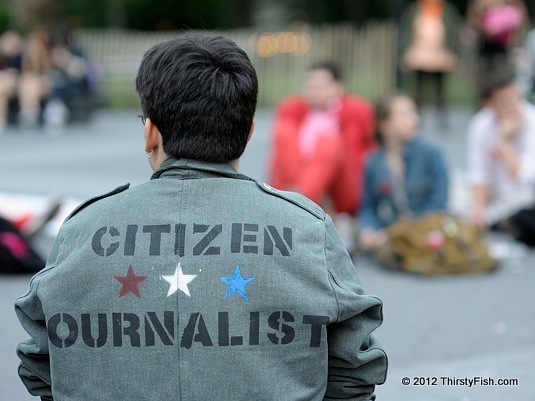Occupy Wall Street: Citizen Journalist

Citizen Journalism is as old as humanity. Ancient people passed the stories of their observations and experiences viva voce to others and to future generations. Journalism is not storytelling. As a discipline, it developed out of the need to convey information relevant to a broad audience factually. Formal education in journalism began in the early 20th century, and modern journalism took shape in the 1950's. Before the golden age of journalism, most journalists were ordinary citizens. In fact Benjamin Franklin published America's first financially successful newspaper, The Pennsylvania Gazette with only two years of formal education that he received before the age of ten. Many of the Founding Fathers were also citizen journalists and understood the importance of freedom of the press for a healthy nation, thus, incorporated it into the First Amendment to the Constitution.
Thanks to the Internet and modern technology, citizen journalism has seen a revival. Ordinary citizens can collect, analyze, report, augment, fact-check and distribute information without the need for expensive tools or corporate media outlets. This poses the question, do we still need professional journalism in the age of the Internet and alternative media?
News reporting, conveying information factually, has been backsliding in the last few decades. Pressured by ratings and circulation, the mainstream media has increasingly shifted towards yellow journalism, sensationalism, punditism and bias. Is Mickey Mouse's birthday really news? Furthermore, there is a disconnect between professional journalists and their media employers. Many journalists are finding that their stories are not run, heavily edited, pushed to the back pages or spinned out of context. News suffers due to selection bias by editors and the influences behind them. Soundbites and glamorous or dramatic stories are run instead of newsworthy and socially relevant ones. News has become a form of propaganda, a way to distract people with irrelevant information.
Alternative news by citizen journalists is not any better. The amount of news and news sources are so vast that, the burden of filtering relevant information and assigning credibility to sources, has shifted to the individual. Given that the mainstream media is not necessarily more credible than the alternative media, and vice versa, we are left with task of sorting through information, misinformation and disinformation. An issue as serious as climate change is nearly impossible to validate based on the information presented in the media; One news report says one thing, the other says something else. We are regularly finding ourselves in an information bubble, ratifying our preconceptions, while never finding alternative views tenable. It is time to rethink journalism.
Bill Moyers recently ran a very informative segment on the state of news media: Big Money, Big Media, Big Trouble. It is a must watch!
More Occupy photos.
Song of the Day: We Didn't Start The Fire - Billy Joel (1989)
Posted
- Wed 2012-06-13
Captured
- 2012-05-22
- New York, NY


